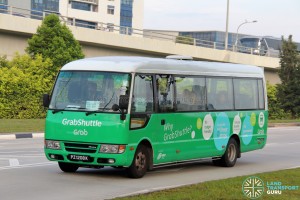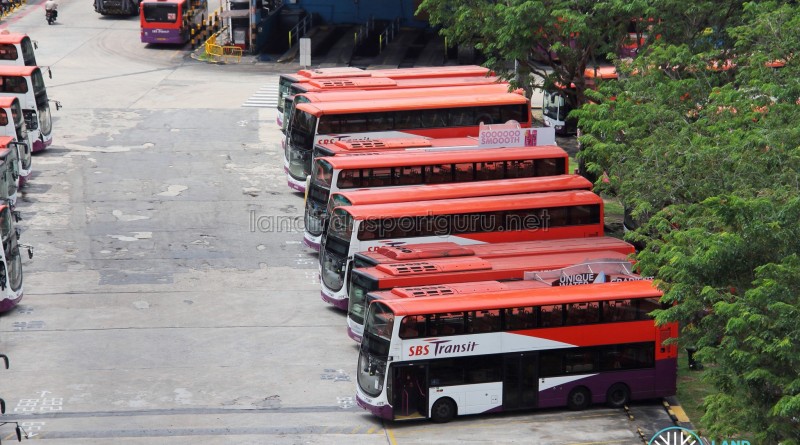On 15 August 2017, LTA called a tender (PT327 – Development and Trial for On-Demand Bus Services) to seek proposals from the industry for on-demand, dynamically-routed public bus services during off-peak periods in areas with low ridership.
With the on-demand bus service scheme, commuters can use a mobile app to request pickups and drop-offs at any bus stop within a defined area.
The LTA called a tender on 15 August 2017 to seek proposals from the industry. It also hopes to extend the concept to night bus services, in place of existing night bus services with fixed timetables and routes. Trials are expected to begin in Dec 2018.
Introduction
Demand Responsive Transport (DRT) is a user-oriented form of public transport characterised by flexible routings based on real-time commuter demand, using a fleet of vehicles operating in shared-ride mode between pick-up and drop-off locations according to passengers needs.
Through a mobile application, commuters will be able to request pick-ups and drop-offs at any bus stop within a defined operating area. The objective is to deliver better and more customised bus services, with the possibility of a shorter wait time. Instead of being able to alight only at a bus stop along a pre-determined, fixed route, passengers can ask to alight at any bus stop in the operating area, making the commute more seamless and convenient than the fixed bus routes of today.
In addition to enhancing the commute, the trial will help LTA assess if such a form of public bus services could optimise resources (buses and bus captains) and operating cost in areas and periods with low ridership.
The First phase of the tender, awarded in February 2018, require the successful firms to conduct modelling and simulation to test service quality and resource requirements, allowing the LTA to determine the parameters for the actual trial.
In the Second phase, awarded in August 2018, public bus operators will test and calibrate software and hardware solutions provided by the successful firms before beginning trials of actual on-demand, dynamically routed bus services from December 2018.
Rollout
The trial is expected to be conducted on seven bus services plying three areas – Joo Koon (for Services 253, 255 and 257), Punggol North/West (for Services 84 and 382) and Shenton Way/Marina South (for Services 400 and 402). These areas currently experience low demand for bus services during off-peak hours and might better serve commuters if converted into on-demand services.
In the lead-up to the actual trial, LTA promised to work with the bus operators and communities to educate and assist residents and commuters in the trial areas on how to use such bus services. During the trial, the usual scheduled bus services will continue to be operated at lower frequencies, for the benefit of commuters who are unfamiliar with the new bus services.
Comparable technologies

Demand-responsive transport has become readily available in Singapore with the emergence of ride-sharing companies such as Uber and Grab, which have large pools of resources to tap on. At the touch of a button, the app quickly assigns a taxi or private-hire vehicle to a customer’s location.
A local startup, SWAT, provides on-demand and pre-booked bus services via its fleet of minibuses. The service started in 2016, and in June 2017, the company raised S$3 million to expand its minibus ride-sharing services locally.
Away from the on-demand market, providers like Beeline and GrabShuttle operate single-trip bus services based on community demand which will be activated only after a sufficient number of people back the service. Most trips are operated with minibuses, with coaches operating on the more popular routes.
Case Studies in other countries
Demand responsive transport has been implemented in many countries on a large scale, such as the United States, United Kingdom, Australia, Italy and Japan. Other countries have similar services on a smaller scale. Such services often operate at a loss and several have been withdrawn after high expenditure costs.
Tender Process
PT327 – Development and Trial for On-Demand Bus Services
Originally scheduled to close on 18 Sep 2017 at 4:00pm, the tender closing date was extended to 16 Oct 2017 at 4:00pm.
Participating companies were:
| S/No | Tenderer | Tender Amount | Remarks |
| 1. | Bridj | SGD 1.00 | Refer to Price Proposal |
| 2. | Continental Automotive Singapore Pte. Ltd. | SGD 250,000.00 | |
| 3. | Ernst & Young Advisory Pte Ltd | SGD 2,297,987.00 | |
| 4. | GrabCar Pte Ltd | SGD 350,280.00 | |
| 5. | MagicBus, Inc | SGD 15,000.00 | |
| 6. | Ministry of Movement Pte. Ltd | SGD 389,782.50 | |
| 7. | PricewaterhouseCoopers Consulting (Singapore) Pte. Ltd. | SGD 214,647.93 | |
| 8. | ST Electronics (Info-Comm) Systems Pte. Ltd | SGD 398,696.00 | |
| 9. | Systra MVA Singapore Pte Ltd | SGD 471,649.00 | |
| 10. | Via Transportation Inc | SGD 76,412.00 |
The first phase of the tender was awarded to Via Transportation, Inc. (Via) and Ministry of Movement Pte. Ltd (SWAT) at a combined sum of S$466.2 million on 13 February 2018.
The second phase of the tender was also awarded to Via and SWAT at a combined sum of S$2.26 million on 27 August 2018.
See Also:
External Links & References:
- Hail a Public Bus with Your App! – LTA
- LTA Awards Second Phase of Contract for On-Demand Public Buses Trial For More Seamless And Convenient Bus Journeys – LTA
Back to Bus Services
Back to Bus Articles

Sydney is running a similar trial, and they will be using minibus. Buses on demand has been practiced by ComfortDelgro’s QCity Transit for quite a while now in small towns as well.
Why isn’t CT8 and CT18 trialing in this scheme? They both also experience low ridership during weekdays and takes long time for the bus to come.